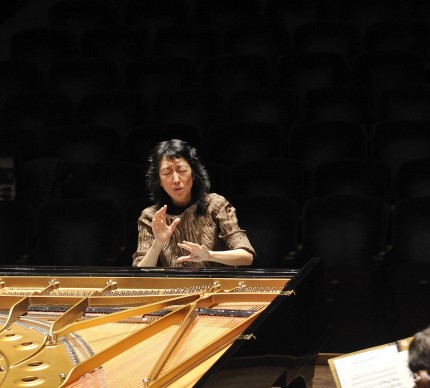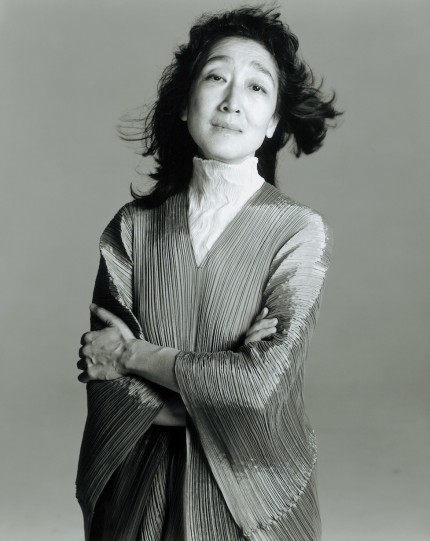Mitsuko Uchida brings unique mix of scholarship and intimacy to Mozart and Schumann
For thousands of music lovers, the highlight of Chicago’s musical season is about to begin.
On Thursday night pianist Mitsuko Uchida will open a four-performance engagement as conductor and soloist with the Chicago Symphony Orchestra in an all-Mozart program. She will be back on stage at Symphony Center the following week as soloist in the Schumann Piano Concerto with the CSO and music director Riccardo Muti.
Uchida, 62, has been renowned for her approach to Mozart, a blend of pristine technique and deeply felt insight, since 1982 when she captivated audiences and critics with a cycle of Mozart’s complete piano sonatas. She took on the dual role of soloist and conductor in the composer’s piano concertos later that year with the English Chamber Orchestra. She made her CSO conducting debut in 2004, and since 2007 has been back virtually every year as a Mozart soloist and conductor.
Born in Japan, trained as a teenage pianist in Vienna and a long-time resident of London, Uchida fell in love with the piano as a toddler. Her love of Mozart is nearly as long-standing. But she became a Mozart conductor by chance.
“Why something happens is always by chance,’’ she declared during an interview in the sleek guest soloist’s dressing room in the basement of Symphony Center earlier this week. Onstage, Uchida favors delicately flowing, multi-hued tunic jackets and slacks. But bowing to Chicago’s 20-degree weather, she was bundled in a teal wool turtleneck sweater, grey vest and black pants. Words pour out of Uchida, sometimes in unusual syntax. They come with the kind of clipped emphasis that would sound didactic were her voice not so light and musical. Her enthusiasms are infectious, whether she is holding forth on the mechanics of 18th-century pianos or Mozart’s letters to his difficult father.
“I jumped in for the English Chamber Orchestra,” said Uchida of her conducting debut 31 years ago. “Murray Perahia was going to play [and] direct, and he canceled. The ECO turned to me—I don’t know why, but they did. Maybe it was because I had just done my Mozart piano sonatas complete, and there was a certain interest in me suddenly. At that point, I said, ‘I never conducted or did any such things. I’m not going to do much of conducting.’ They said, ‘Don’t worry.’
At that time, said Uchida, the ECO included players who had performed and recorded the complete Mozart concertos with Daniel Barenboim and Perahia, both pianists who conducted from the piano.
“I got along with a number of the players really very, very well,’’ Uchida said. “It was a lot of fun and apparently they loved it.” She ended up doing the complete set of concertos with the ensemble.

Mozart’s piano concertos became a high-profile element in the CSO’s seasons between 1991 and 2006 when Daniel Barenboim was music director. Like Uchida, he appeared as soloist and conductor.
‘They couldn’t be more different,’’ said Robert Chen, CSO concertmaster, comparing the ways Uchida and Barenboim approach Mozart. “Both are obviously musicians of the highest stature, but for Barenboim, he is presenting a very grand canvas. With Mitsuko, there’s a certain privacy to her feelings toward the piece. For her, it’s not so much a public act.
“Barenboim is all about putting something out there—it’s very beautiful and very generous,” Chen added. “With Mitsuko, it’s more precious, and I don’t mean that in a bad sense. It’s like a small piece of very fine china that you examine from all angles. You see how the light reflects on certain things, the colors are very vivid.”
Uchida may be best known for her way with Mozart, but she has never been interested in limiting her horizons. Her repertoire ranges from Bach to 20th-century composers.
As a young girl, she fought to play more freely, finding her teachers, first in Japan and later in Vienna, too didactic about how a piece of music should sound. Her father, a diplomat, never wanted his talented daughter to pursue a solo career.
“My father’s ideal,” said Uchida, “would have been that I wouldn’t have been that good [as a pianist] and couldn’t quite make it. I would be living in Japan close to them and get married to a Japanese guy. I would teach [piano to] kids, lots of kids. At that time you could make a huge amount of money by teaching kids or grownup people. It was a real racket. I would play one recital a year so he could attend and feel proud. That was the ideal scenario.’’
That vision was doomed almost from the start. Uchida was 12 when her father was transferred to a diplomatic post in Vienna. She reveled in the heady musical atmosphere, and when he was transferred home four years later, she figured out a way to stay in Vienna.
“I was fiercely independent,’’ Uchida said. To his credit, her father didn’t stand in her way.
Uchida’s passion for music has led to long hours studying composers’ original manuscripts. Mozart is famous for his cleanly written scores, setting down the music as if taking dictation. Despite his “ghastly’’ hand writing, said Uchida, “what Beethoven wrote, he meant.”
She has been studying Schumann’s scores for the past three years in preparation for his 200th birthday season. His scores, she said, are an entirely different matter, full of corrections and redone passages. Her despair over untangling their complex strands is almost comic.
“Schumann, poor thing, poor thing,’’ she exclaimed. “He didn’t know how to write it down and he changed his mind. Schumann was a pianist, so he could write only for the piano. But he didn’t even know how to write for the piano as such. In his mind, he was a genius, a most imaginative composer, so inventive. But he didn’t know how to put that onto the paper most efficiently. He forgets that the pianist has only two hands.”
Uchida believes that Schumann would be fertile, if frustrating territory, for music scholars, like those who have delved so deeply into the music of Bach, Mozart and Beethoven.
“It is still the least explored,’’ said Uchida. “Because he was so peculiar, you need a maniac who would really want to do it. You need to have a single maniac who is obsessed with Schumann. Of course, you really need several.”
She is looking forward to playing Schumann’s Piano Concerto with the CSO and Muti.
“I adore working with him,’’ she said, though she has not performed extensively with the Italian conductor. “He is such an absolute professional. That he is a glorious conductor is one thing everybody knows about him.
“But from my point of view, when I work with Riccardo Muti I know what a clear-cut and precise musician he is. He knows what he is doing. There is no half-way measure. It is pure joy.’’
Mitsuko Uchida performs Mozart’s Piano Concertos Nos. 11 and 21 with the Chicago Symphony Orchestra Thursday through Feb. 1. She will also perform Schumann’s Piano Concerto with Riccardo Muti and the CSO Feb. 3-8. That program will include Shostakovich’s Symphony No. 5. cso.org; 312-294-3000.
Posted in Articles



